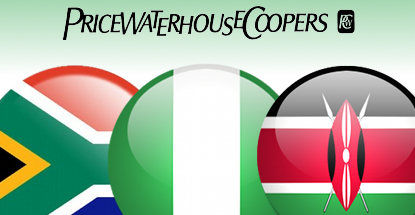 South Africa’s furtive attempts to pass online gambling legislation aren’t likely to go anywhere for the foreseeable future, according to a new report from PricewaterhouseCoopers (PwC). Nikki Forster, PwC’s gambling leader for South Africa, says there is “hesitation” on the part of the government to advance the online gambling issue because it “doesn’t believe it creates jobs and it could add to gambling addiction problems. Based on these messages, I don’t see anything happening for quite a period of time.”
South Africa’s furtive attempts to pass online gambling legislation aren’t likely to go anywhere for the foreseeable future, according to a new report from PricewaterhouseCoopers (PwC). Nikki Forster, PwC’s gambling leader for South Africa, says there is “hesitation” on the part of the government to advance the online gambling issue because it “doesn’t believe it creates jobs and it could add to gambling addiction problems. Based on these messages, I don’t see anything happening for quite a period of time.”
Forster was speaking in Johannesburg at the launch of PwC’s new Gambling Outlook: 2014 – 2018 (South Africa, Nigeria, Kenya) report (read it here). South Africa has by far the largest gambling industry among the three nations and the overall South African gambling market is tipped to post 6.2% annual growth, rising from R21.8b in 2013 to R29.5b by 2018.
South Africa has 37 licensed operating casinos that generated revenues of R16.5b (US $1.6b) in 2013. PwC expects casino revenue to rise at a rate of 3.9% per year, topping R20b by 2018. Casinos accounted for 76% of South Africa’s total gambling pie in 2013, down from 78% in 2012.
Sports betting (including horseracing) accounted for 13% of last year’s total revenue, up from 12% in 2012. PwC projects 12% annual growth for betting revenue, rising from R2.8b in 2013 to R5b by 2018.
Horseracing remains the dominant form of betting with revenue of R1.8b while actual sports betting generated R1b. However, the mature racing market has grown an average of just 5% over the past three years while sports grew 18.5% last year and has more than quintupled since 2009. PwC expects sports to overtake racing within the next five years thanks to a proliferation of sports betting shops and online wagering (the only internet action currently permitted).
Limited payout machines (LPM), which operate outside casinos and offer a maximum wager of just R5 (45¢), accounted for 8% of 2013’s gambling revenue, up one point from 2012. PwC projects 10% annual revenue growth to R2.8b by 2018 for LPM. Bingo is currently the smallest gambling earner at just 3% of 2013’s total but will grow the fastest, rising 19% per year to R1.8b by 2018.
In Nigeria, the country’s gambling revenue is expected to grow 7.7% per year to $58m by 2018. The country’s three licensed casinos reported revenue up 19.4% to $40m in 2013 but the current Ebola scare is expected to slow down growth, at least for the next few years until the crisis subsides.
In Kenya, the country’s 13 licensed casinos reported revenue up 7.6% to $18.4m in 2013 and PwC expects average growth of 6.8% until 2018. Kenya has a comparatively liberal gambling policy, with online gambling and mobile gambling operators proliferating (although revenue data is lacking). BetKenya was the nation’s first online betting site and was joined by EliteBet Kenya this January and SportPesa in February.
Kenya is currently waging an internal turf war over gambling licensing authority. In August 2013, Nigeria’s government granted the Council of Governors of counties the right to issue gambling licenses, a move that was challenged by the Betting Control and Licensing Board (BCLB), who want to keep that authority for themselves. The Council of Governors retaliated by warning operators that counties wouldn’t recognize licensed issued by the BCLB. The issue remains unresolved.
